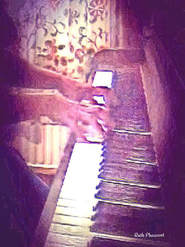
Here are some ideas about playing music more expressively. After all, playing music is about much more than just playing the correct notes with the correct rhythm. A piece of music can be perfectly executed as far as note pitches and lengths of notes are concerned, but without expression it will just sound mechanical. Music is a work of art and it is about communication of ideas, emotions, stories etc. People may listen to music for entertainment, relaxation, inspiration, motivation, nostalgia, catharsis and more; so it needs to be more than just a robotically performed sequence of notes. Here are a few things to consider when learning a piece of music:
Observe dynamics and other performance directions such as tempo, articulation and phrasing.
Sing or imagine singing the melody - this helps to give more insight into shaping, phrasing and articulation. Also imagine singing the bass line - this helps you to see the musical patterns, harmonic outlines and melodic nature of the bass line, as opposed to just seeing it as a random sequence of notes.
Focus on the main melody and bring it out so that it sings out above the accompaniment. The accompaniment should be more in the background. Look at secondary melodic parts and have them one level down in prominence from the main melody, but above the accompaniment.
Listen to a recording and observe the feelings and ideas that the music evokes in you such as character, mood, narrative, story. See if you can describe the character and mood in words; e.g. happy, sad, lively, energetic, dance like, solemn, mysterious, nostalgic, funereal ....
Perhaps invent a story or narrative that fits with the progression of feelings throughout the piece.
Focus on the sound you're making, the feeling of the keys under your fingers and the feeling of your finger muscles moving. Staying present with sounds and sensations like this helps you to communicate the music more effectively, as opposed to letting your mind wander and playing unconsciously. You could also focus on the mental imagery or emotions that the music evokes. If your mind wanders, bring it back to whatever your chosen focus is. Perhaps expand your awareness to encompass all these things - sound, physical sensations, imagery associated with the character of the music etc. This kind of focus or awareness and being in the moment can also help to reduce excessive anxiety about a performance. It is preferable to worrying about all the things that can go wrong.
Physically feel the beat. Keep the rhythm flowing. Imagine moving in time to the music. Emphasise the strong beats and notice the momentum created by syncopated rhythms.
These are just a few ideas that may help you to start to see the music you practise as an expressive art form that is open to interpretation and that can evoke a myriad of emotions.
You might also like to read my articles about performance directions and performance nerves.
All articles about expression
Articles main menu
Some expressive pieces that I have recorded on video:
Beethoven "Moonlight" Sonata 1st Mvt.
Schumann Romances No. 1 and No. 2.
Schubert Impromptu No. 3.
Hofmann Am Abend.
Burgmuller L'orage
Observe dynamics and other performance directions such as tempo, articulation and phrasing.
Sing or imagine singing the melody - this helps to give more insight into shaping, phrasing and articulation. Also imagine singing the bass line - this helps you to see the musical patterns, harmonic outlines and melodic nature of the bass line, as opposed to just seeing it as a random sequence of notes.
Focus on the main melody and bring it out so that it sings out above the accompaniment. The accompaniment should be more in the background. Look at secondary melodic parts and have them one level down in prominence from the main melody, but above the accompaniment.
Listen to a recording and observe the feelings and ideas that the music evokes in you such as character, mood, narrative, story. See if you can describe the character and mood in words; e.g. happy, sad, lively, energetic, dance like, solemn, mysterious, nostalgic, funereal ....
Perhaps invent a story or narrative that fits with the progression of feelings throughout the piece.
Focus on the sound you're making, the feeling of the keys under your fingers and the feeling of your finger muscles moving. Staying present with sounds and sensations like this helps you to communicate the music more effectively, as opposed to letting your mind wander and playing unconsciously. You could also focus on the mental imagery or emotions that the music evokes. If your mind wanders, bring it back to whatever your chosen focus is. Perhaps expand your awareness to encompass all these things - sound, physical sensations, imagery associated with the character of the music etc. This kind of focus or awareness and being in the moment can also help to reduce excessive anxiety about a performance. It is preferable to worrying about all the things that can go wrong.
Physically feel the beat. Keep the rhythm flowing. Imagine moving in time to the music. Emphasise the strong beats and notice the momentum created by syncopated rhythms.
These are just a few ideas that may help you to start to see the music you practise as an expressive art form that is open to interpretation and that can evoke a myriad of emotions.
You might also like to read my articles about performance directions and performance nerves.
All articles about expression
Articles main menu
Some expressive pieces that I have recorded on video:
Beethoven "Moonlight" Sonata 1st Mvt.
Schumann Romances No. 1 and No. 2.
Schubert Impromptu No. 3.
Hofmann Am Abend.
Burgmuller L'orage